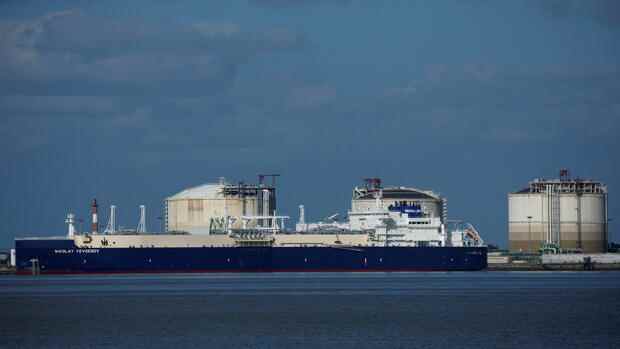Paris France offers Germany gas supply support. As the Handelsblatt learned from French government circles, several options are currently being examined in Paris to mitigate the consequences of the reduced deliveries from Russia via the Nord Stream 1 pipeline. It is conceivable that France will make its terminals available for deliveries of liquefied natural gas (LNG) to the Federal Republic.
“We want to help our European partners and are ready to deliver gas to Germany if there is a request for solidarity,” says the Ministry of Energy in Paris. They are talking to the federal government “about the possibility of concluding an agreement in the coming weeks”.
The offer of help from the neighboring country will not be able to fully compensate for the impending gas shortage in Germany. The possible delivery quantities are too small for this, and there are technical hurdles. France is also worried about the security of its own energy supply with a view to next winter.
However, the country is less dependent on Russian gas and has already filled the storage facilities well. Data from the interest group Gas Infrastructure Europe (GIE) shows that the fill level in France is a good 75 percent, while in Germany it is only 66 percent.
Top jobs of the day
Find the best jobs now and
be notified by email.
Four LNG terminals in France
So far, Germany does not have its own LNG terminal, while the French already have four of these facilities. A fifth floating terminal for the import of liquid gas is to be built in the port of Le Havre. According to the proposal from Paris, the Federal Republic of Germany could temporarily alleviate its gas shortage with this infrastructure.
“France has so far been more relevant for Germany at the transit level,” says Niko Bosnjak from Open Grid Europe, one of the leading European long-distance gas network operators. Some of the deliveries via Nord Stream 1 and other lines from Russia flowed through German pipelines to France.
The main route runs via the Obergailbach-Medelsheim border point in Saarland. A second, lower-priority route runs via Wallbach on the Swiss border: this is the route for gas to flow primarily south towards Italy, but there is also a branch to France there.
Russian gas practically no longer reaches its western neighbor because of reduced supplies. The French offer to ship LNG from their LNG terminals to Germany would reverse the flow of gas. “Technically, the station in Obergailbach-Medelsheim can be used in both directions, theoretically it could be done,” says Bosnjak.
But there is a problem: in France, the gas is odorised at the transmission level, which means that odorous substances are added to the gas so that the consumer can smell if there is a leak. In Germany, this safety measure is decentralized in the distribution grid.
Odorized gas is not permitted for long-distance pipelines in Germany. “The odorization in France means that there is a little more sulfur in the natural gas, which can lead to faster wear of the network and large consumers,” explains Bosnjak.
Andreas Schröder from the market research company ICIS also says: “France is currently unable to export gas volumes directly to Germany.” At most, smaller gas volumes could reach Germany from the LNG terminal in Dunkerque in northern France via Belgium. A limited delivery would also be possible via Switzerland. Since last year, there has been a deodorization plant on the border of the pipeline there with Baden-Württemberg, which can process the gas for the German transmission network.
>> Read also: Wintershall wants to produce more gas and oil from its German fields
The French government is aware of the restrictions. “There is the question of the compatibility of our standards,” says the Ministry of Energy. At the same time, it is made clear there: “We are ready to export odorized gas to Germany.” The simplest way would be to allow deliveries from France in the German network with an exception.
Bosnjak from Open Grid Europe sees no fundamental obstacle to this: “If the legal prerequisites are created, one could take over odorized gas from France in an emergency, it would not have any immediate effects,” he says. “Possibly, however, signs of wear could appear more quickly a few years later.”
The process of de-odorization is “not rocket science, technically complex, but feasible for us,” says Bosnjak. “The problem is the quantities. Large plants would be necessary, but they would first have to be planned, approved and built.” The construction of a deodorization station on the border with Saarland, according to the estimate by the Ministry of Energy in Paris, would take at least 18 months.
Paris wants to “reverse the flow of gas in Europe”
France is pursuing the goal of adapting the gas network in Europe to the new geopolitical reality after the Russian war of aggression against Ukraine. “The entire European network is geared towards allowing Russian gas to flow as far as Brittany,” says a representative of the energy ministry in Paris. The lines are aligned from east to west, but the capacities from west to east are much more limited. “We need to reverse the flow of gas in Europe.”
The expansion of the Obergailbach-Medelsheim station is of crucial importance in the French plans. Paris is also pursuing economic interests and hopes to position itself as a hub for gas flows. “The priority in Europe is the expansion of decarbonized energies,” according to government circles in Paris. But the EU countries would still be dependent on fossil fuels for some time to come. “In the coming months and years, France, with its LNG terminals, can play a key role in supplying Europe with liquefied natural gas.”
More: EU states agree – Europe should use less gas in winter
